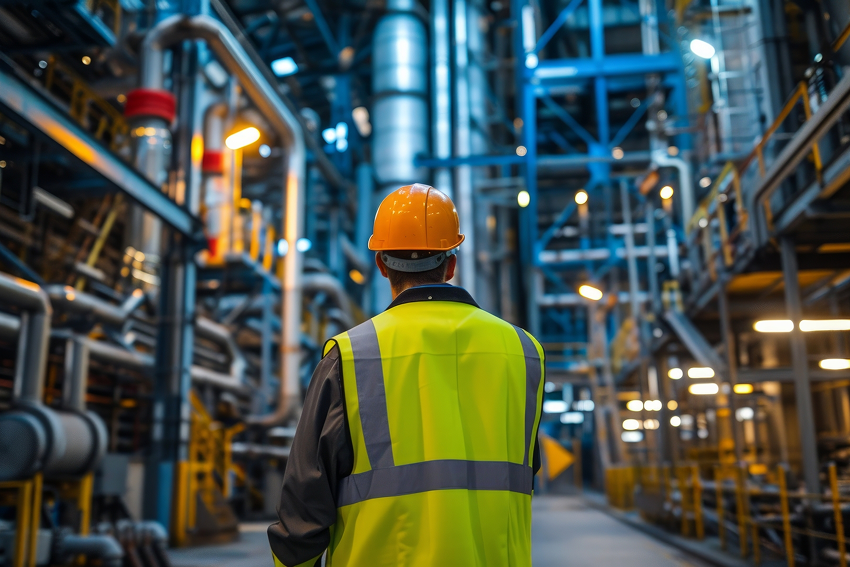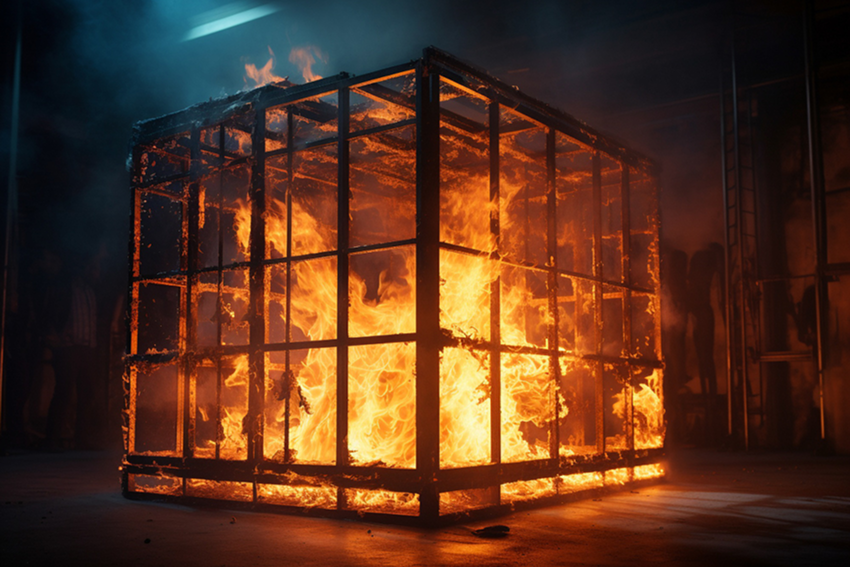Industrial All Risk Policy
Industrial All Risk Insurance covers property damage, machinery breakdown, and business interruption for industrial units with Rs. 50 crores minimum coverage.
- Material Damage
- Machinery Breakdown
- Machinery Breakdown

What is an Industrial All Risk Policy?
An Industrial All Risk (INDUSTRIAL ALL RISK) Policy is a comprehensive INSURANCE policy covering various risks for industrial and manufacturing units. It includes protection against physical damage to property, machinery breakdown, and business interruption losses. To be eligible, premises must have a minimum sum insured of Rs. 50 crores per location, ensuring substantial industrial risks are adequately protected.
What is covered under an Industrial All Risk Policy?
Material Damage
Protection against physical loss or damage to buildings, machinery, equipment, stock, and other contents due to perils such as fire, natural disasters, theft, and accidental damage.
Machinery Breakdown
Coverage for the sudden and accidental breakdown of machinery, which includes repair or replacement costs.

What is covered under an Industrial All Risk Policy?
Material Damage
Protection against physical loss or damage to buildings, machinery, equipment, stock, and other contents due to perils such as fire, natural disasters, theft, and accidental damage.
Machinery Breakdown
Coverage for the sudden and accidental breakdown of machinery, which includes repair or replacement costs.
What are the additional covers under an Industrial All Risk Policy?
Fire and Special Perils
Coverage for fire and other specified perils such as lightning, explosion, aircraft damage, riot, strike, malicious damage, storm, cyclone, typhoon, tempest, hurricane, tornado, flood, inundation, and impact damage.
Burglary
Protection against loss or damage due to burglary.
Machinery Breakdown
Coverage for the sudden and accidental breakdown of machinery, including boiler explosion and electronic equipment INSURANCE.
Business Interruption
Compensation for loss of income or increased operating expenses resulting from an insured event that disrupts business operations due to fire and special perils.
Debris Removal
Covers necessary expenses for the removal of debris of insured property from the described premises as a result of physical loss or damage insured against under the policy.
Professional Fees
Coverage for architects' surveyors' and consulting engineers' fees necessarily incurred in the reinstatement of the property insured following loss or damage.
Temporary Removal of Stocks
INSURANCE for stock temporarily removed to any other premises for purposes such as fabrication, processing, or finishing.
Omission to Insure Additions, Alterations, or Extensions
Coverage for unintentional omission to insure additions, alterations, or extensions to the insured property during the policy period.
What are the exclusions under an Industrial All Risk Policy?
The exclusions under an Industrial All Risk Policy include:
- Faulty or defective design, materials, or workmanship; inherent vice, latent defect, gradual deterioration, deformation, distortion, or wear and tear; interruption of water, gas, electricity, or fuel systems, or failure of effluent disposal systems unless damage by a covered cause ensues.
- Collapse or cracking of buildings; corrosion, rust, extremes or changes in temperature, dampness, dryness, wet or dry rot, fungus, shrinkage, evaporation, loss of weight, pollution, contamination, change in color, flavor, texture, or finish, action of light, vermin, insects, marring, or scratching unless caused directly by covered damage.
- Larceny; acts of fraud or dishonesty; disappearance, unexplained or inventory shortage, misfiling or misplacing of information, shortage in supply or delivery of materials, or shortage due to clerical or accounting error.
- Coastal or river erosion; normal settlement or bedding down of new structures.
- Any willful act or willful negligence by the insured or anyone acting on their behalf; cessation of work, delay, or loss of market, or any other consequential or indirect loss.
- War, invasion, act of foreign enemy, hostilities, civil war; mutiny, civil commotion, military or usurped power, rebellion, revolution, insurrection.
- Permanent or temporary dispossession due to nationalization, commandeering, or requisition by any lawfully constituted authority; destruction of property by order of any public authority.
- Nuclear weapons material; ionizing radiations or contamination by radioactivity from nuclear fuel or nuclear waste.
Why should companies take an Industrial All Risk Policy?

Key suggestions to make the best Industrial All Risk Policy plan
Conduct a Detailed Risk Assessment
Perform a comprehensive risk assessment of the property, including evaluating fire/explosion hazards, security measures, and the adequacy of existing safety protocols.
Customize Coverage
Include necessary clauses such as the Agreed Bank Clause, Architects’ Surveyors’ and Consulting Engineers’ Fees Clause, and Temporary Removal of Stocks Clause to ensure comprehensive protection.
Review Deductibles
Opt for suitable deductibles based on the risk assessment. Consider higher voluntary deductibles to receive premium discounts, but ensure they are manageable in case of a claim.
Maintain Up-to-Date Records
Keep detailed records of maintenance, safety drills, and disaster management plans. Implement recommendations from safety committees and ensure operators are trained and aware of safety procedures.
Regular Policy Review
Periodically review and update the policy to reflect changes in the business operations, asset values, and emerging risks. Ensure continuous cover to the full extent by paying pro-rata premiums for any loss settlements.
Property in a premises that cannot be insured in an Industrial All Risk Policy
Following property cannot be insured under an Industrial All Risk Policy:
- Money, cheques, stamps, bonds, credit cards, securities, jewelry, precious stones, precious metals, bullion, furs, curiosities, rare books, or works of art unless specifically mentioned.
- Goods held in trust or on commission, documents, manuscripts, business books, computer systems, records, patterns, models, molds, plans, designs, explosives unless specifically mentioned.
- Vehicles licensed for road use, caravans, trailers, railway locomotives or rolling stock, watercraft, aircraft, spacecraft, or the like.
- Property or structures in the course of demolition, construction, or erection, and materials or supplies in connection therewith.
- Land, driveways, pavements, roads, runways, railway lines, dams, reservoirs, canals, rigs, wells, pipelines, tunnels, bridges, docks, piers, jetties, excavations, wharves, mining property, underground, offshore property unless specifically covered.
- Livestock, growing crops, or trees.
- Property damaged as a result of undergoing any process.
- Property undergoing alteration, repair, testing, installation, or servicing unless damage by a covered cause ensues.
- Property more specifically insured under another policy.
- Property insured if removed to any place other than where it is stated to be insured, except machinery and equipment temporarily removed for repairs, cleaning, or renovation for up to 60 days.
- Damage to property insured by any marine policy except for any excess beyond what would have been payable under the marine policy had this INSURANCE not been effected.
Important Conditions in an Industrial All Risk Policy

Coverage and Exclusions under Business Interruption Section of Industrial All Risk Policy
- Interruption or Interference: Covers losses due to business interruption from insured damage under the Material Damage section.
- Gross Profit Losses: Covers loss of gross profit due to reduced turnover and increased working costs to mitigate turnover reduction.
- Additional Expenditure: Covers additional necessary expenditure to avoid or reduce turnover loss during the indemnity period.
Exclusions:
- Public Authority Restrictions: Losses from restrictions on reconstruction or operation by public authorities.
- Capital Insufficiency: Losses due to insufficient capital for timely property restoration or replacement.
- Lease or License Issues: Losses from suspension, lapse, or cancellation of leases, licenses, or orders after restoration.
- Boiler and Machinery Damage: Damage from the explosion or rupture of boilers, turbines, or pressure vessels.
- Electronic Installations: Losses from damage to electronic installations, computers, and data processing equipment.
- Mechanical or Electrical Breakdown: Losses from mechanical or electrical breakdowns.
- Deductibles: The policy does not cover the specified deductible amount.
How is an Industrial All Risk (INDUSTRIAL ALL RISK) Policy different from a Standard Fire & Special Perils Policy?
| Aspect | Industrial All Risk (INDUSTRIAL ALL RISK) Policy | Standard Fire & Special Perils Policy |
|---|---|---|
| Scope of Coverage | Comprehensive coverage including material damage, machinery breakdown, boiler explosion, electronic equipment insurance, and business interruption | Covers loss or damage due to fire and specified perils like lightning, explosion, aircraft damage, riot, storm, cyclone, flood, impact damage, subsidence, and landslide |
| Eligibility and Sum Insured | Requires a minimum sum insured of Rs. 50 crores per location for large industrial risks | Available to a wider range of businesses without a specific minimum sum insured |
| Coverage for Machinery Breakdown and Business Interruption | Includes machinery breakdown and business interruption losses | Does not inherently cover these; can be added as separate endorsements |
| Policy Conditions and Deductibles | Includes compulsory deductibles for claims, offers options for voluntary deductibles with premium discounts | Has set conditions and deductibles, generally less flexible |
| Customization and Additional Clauses | Highly customizable with various clauses such as Agreed Bank Clause, Architects’ Fees Clause, Temporary Removal of Stocks Clause | Customization possible but less flexible |

| Aspect | Industrial All Risk (INDUSTRIAL ALL RISK) Policy | Standard Fire & Special Perils Policy |
|---|---|---|
| Scope of Coverage | Comprehensive coverage including material damage, machinery breakdown, boiler explosion, electronic equipment insurance, and business interruption | Covers loss or damage due to fire and specified perils like lightning, explosion, aircraft damage, riot, storm, cyclone, flood, impact damage, subsidence, and landslide |
| Eligibility and Sum Insured | Requires a minimum sum insured of Rs. 50 crores per location for large industrial risks | Available to a wider range of businesses without a specific minimum sum insured |
| Coverage for Machinery Breakdown and Business Interruption | Includes machinery breakdown and business interruption losses | Does not inherently cover these; can be added as separate endorsements |
| Policy Conditions and Deductibles | Includes compulsory deductibles for claims, offers options for voluntary deductibles with premium discounts | Has set conditions and deductibles, generally less flexible |
| Customization and Additional Clauses | Highly customizable with various clauses such as Agreed Bank Clause, Architects’ Fees Clause, Temporary Removal of Stocks Clause | Customization possible but less flexible |
Frequently Asked Questions
Comprehensive Coverage for Industrial Excellence
Ensure complete protection for your industrial unit with Industrial All Risk Insurance from Go Insure India. Covering property damage, machinery breakdown, and business interruption, this policy provides extensive financial security for businesses with a minimum coverage of ₹50 crores, keeping operations resilient and risk-free.











